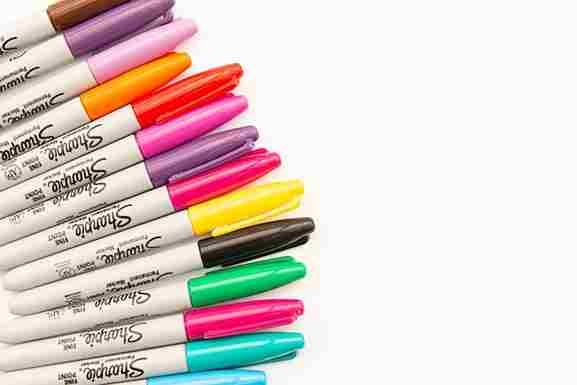In today’s world, the concept of veganism has gained a lot of popularity. It is a lifestyle that excludes the use of any animal products, including food, clothing, and other consumer goods. People who follow a vegan diet usually refrain from consuming meat, dairy, and eggs. They also avoid using leather, wool, and other animal-based products. With the increasing demand for vegan products, people have started questioning the vegan status of various products, including markers. In this article, we will discuss the vegan status of markers and whether they are a suitable option for vegans.
Markers are one of the essential tools used for writing, drawing, and coloring. They are available in different colors, sizes, and types, such as permanent markers, water-based markers, and dry-erase markers. They are widely used by artists, students, and professionals in various fields. Markers are made up of different components, including ink, nib, and barrel. To determine whether markers are vegan or not, we need to examine each of these components.
Ink
Ink is the most crucial component of any marker. It is responsible for creating the color on paper or any other surface. Different types of ink are used in markers, such as dye-based ink, pigment-based ink, and alcohol-based ink. The vegan status of ink depends on the source of the colorants used in it.
Dye-based ink: Dye-based ink is made up of synthetic dyes that are derived from petroleum or coal tar. These dyes are vegan as they do not contain any animal-derived products.
Pigment-based ink: Pigment-based ink is made up of natural or synthetic pigments that are mixed with a binding agent. The binding agent can be made up of different materials, including animal-based products. Some manufacturers use gelatin or casein, which are derived from animal sources, as a binding agent. In such cases, the ink is not considered vegan.
Alcohol-based ink: Alcohol-based ink is made up of alcohol, water, and colorants. The colorants used in alcohol-based ink can be natural or synthetic. If the colorants are synthetic, the ink is vegan. However, if the colorants are natural, they can be derived from animal or plant sources. In such cases, the vegan status of the ink depends on the source of the colorants.
Nib
The nib is the part of the marker that comes in contact with the surface and is responsible for delivering the ink. Nibs can be made up of different materials, including plastic, metal, and fiber. The vegan status of the nib depends on the material used to make it.
Plastic nib: Plastic nibs are vegan as they are made up of synthetic materials.
Metal nib: Metal nibs are made up of different types of metals, including stainless steel, brass, and nickel. Stainless steel and brass are vegan as they do not contain any animal-derived products. However, nickel is not considered vegan as it is often plated with a layer of animal-based material, such as nickel silver, which contains nickel, copper, and zinc.
Fiber nib: Fiber nibs are made up of synthetic or natural fibers, such as nylon or wool. Synthetic fiber nibs are vegan, whereas natural fiber nibs are not considered vegan as they are derived from animal sources.
Barrel
The barrel is the outer casing of the marker that holds the ink and nib. It is usually made up of plastic, but it can also be made up of metal or other materials. The vegan status of the barrel depends on the material used to make it.
Plastic barrel: Plastic barrels are vegan as they are made up of synthetic materials.
Metal barrel: Metal barrels are made up of different types of metals, including aluminum and steel. Aluminum is vegan as it does not contain any animal-derived products. However, some steel may contain small amounts of animal-based materials, such as nickel silver, which is not considered vegan.
Other Materials
Apart from the ink, nib, and barrel, some markers may contain other materials, such as adhesives, solvents, and preservatives. The vegan status of these materials depends on their source.
Adhesives: Some markers may contain adhesives, such as glue or tape, to hold the nib in place. Most adhesives used in markers are synthetic and do not contain any animal-derived products. However, some adhesives, such as animal-based adhesives, can be derived from animal sources.
Solvents: Solvents are used in some markers to dissolve the ink and make it flow smoothly. Most solvents used in markers are synthetic and do not contain any animal-derived products. However, some solvents, such as shellac, can be derived from animal sources.
Preservatives: Some markers may contain preservatives to prevent the growth of bacteria or mold. Most preservatives used in markers are synthetic and do not contain any animal-derived products. However, some preservatives, such as beeswax or lanolin, can be derived from animal sources.
Conclusion
In conclusion, the vegan status of markers depends on the materials used to make them. Most markers are vegan as they are made up of synthetic materials. However, some markers may contain animal-derived materials, such as natural fiber nibs or nickel-plated metal nibs. Therefore, it is essential to check the labels and ingredients of markers before purchasing them to ensure that they are vegan-friendly.
If you are a vegan, you can also consider using eco-friendly markers that are made up of sustainable materials and are biodegradable. These markers are not only vegan-friendly but also environmentally friendly, making them an ideal option for conscious consumers.
In conclusion, markers can be vegan or non-vegan, depending on the materials used to make them. It is crucial to check the labels and ingredients of markers before purchasing them to ensure that they are suitable for your vegan lifestyle. With the increasing demand for vegan products, we can expect more manufacturers to produce vegan-friendly markers in the future.

